New Wave Of Israeli Attacks Reported On Western Tehran And Qom, Where Fordow Enrichment Facility Is Located
Israel's Channel 13 TV has reported new waves of air attacks targeting western Tehran, Qom, and Karaj. The Fordow uranium enrichment facility is located on the outskirts of Qom, but there has been no confirmed report of an attack on this facility so far, it said. According to Israeli military reporters, the goal of continuing attacks on Iranian military bases is to destroy missile bases and deprive Iran of any military capability for a possible Iranian counterattack on Israel.
Trump Says The United States Was Aware Of Israel's Strikes On Iran
- By Reuters
US President Donald Trump told Reuters that the United States "knew everything" about Israel's strikes on Iranian nuclear facilities.
In the interview, Trump questioned whether Iran still has a nuclear program following the barrage of Israeli attacks across the country.
He also said nuclear talks between the United States and Iran are still scheduled for this Sunday, though he expressed doubt about whether they will proceed.
Trump reiterated that it was not too late for Iran to reach a deal. "I tried to save Iran from humiliation and death," he added.
When asked about the possibility of a regional war resulting from Israel’s actions, Trump said he was not concerned.
An Encounter With An Iranian Nuclear Scientist Killed In The Israeli Air Strikes
- By Nathan Hodge
A familiar name surfaced on June 13 in news reports following Israeli strikes on Iran: Fereydoun Abbasi, the former head of Iran’s Atomic Energy Organization.
According to the Iranian news agency Tasnim, Abbasi was one of the prominent Iranian nuclear scientists killed in Israeli air attacks that Israel said were aimed at preventing Tehran from building a nuclear weapon.
Abbasi had been in the headlines before: In 2010, he narrowly survived an assassination attempt when a motorcyclist attached an explosive device to his car in Tehran, part of a string of attacks targeting Iranian nuclear scientists.
I met Abbasi in 2007, when the Iranian government opened up some of its nuclear facilities to journalists to showcase what it described as its peaceful nuclear intentions. My visit to Iran included a visit to the city of Isfahan to tour the uranium conversion facility there. Iran’s primary enrichment facility in Natanz, which was hit in Israel’s June 13 strikes, was not on the itinerary.
To read the full story, click here.
Fabian Hinz, Research Fellow for Defense and Military Analysis, International Institute for Strategic Studies
Israel's attack on Iran appear to be an effort to replicate the tactics it's used against the militant group Hezbollah in Lebanon, an expert said.
"So what we saw was a major attack by the Israelis on various sites associated with the nuclear program, including Iran's main enrichment site in Natanz, as well as air defenses, potentially ballistic missile sites," said Fabian Hinz, Research Fellow for Defense and Military Analysis, at the International Institute for Strategic Studies. "We saw a few impacts and Tabriz and Karaman Shah, which of course asides housing the main basis of Iran's missile program or at least the main basis for the missiles with a range to Israel."
"And at the same time the assassination of high-ranking military commanders and nuclear scientists that previously were involved in the Iranian nuclear weapons effort. To me it looks like that Israel is trying to some extent to copy its modus operandi, which it used against Hezbollah quite successfully," he told RFE/RL's Radio Farda. "Decapitation, taking out strategic capabilities, all of that very, very rapidly."
Backed by Iran, Hezbollah turned into a major governing force in Lebanon, and a persistent threat to Israel. With the onset of the Gaza war, Israel has inflicted major damage on the group's leadership, raising questions about its ability to continue.
"With the nuclear facilities, I would say we haven't seen an attack on Fodow yet. That in many ways is the most worrying facility for the Israelis because it's so deep underground that you cannot conventionally destroy it with the bombs known to be in Israel's arsenal," he said.
Israel might consider using special forces to attack it, or sabotage or even a cyber attack," he said.
"The Israelis have now reached a point where Iranian air defenses are incredibly weak," Hinz said.
"So follow up strikes can happen and will likely happen in the future, in the near future. And the question is, how will Iran retaliate? They will certainly retaliate. Ballistic missiles would be the weapon of choice. They can do the most damage," Hinz said. They've shown that they're not that accurate enough to really precisely hit military targets last year. However, if you direct them against cities, you could do more damage," he said.
Saudi Arabia Denounces 'Blatant Israeli Aggression'
- By RFE/RL
Saudi Arabia, which is seen as a regional rival to Iran in the Middle East, condemned Israel's overnight strikes on Iranian missile and nuclear sites.
Riyadh's relations with Israel have historically been much more tense, in particular over the issue of Israeli treatment of Palestinians.
Trump Calls On Tehran To Negotiate 'Before It's Too Late' After Unprecedented Israeli Strikes
US President Donald Trump warned Iran to make a nuclear deal "before it is too late" as Israel continued to conduct air strikes on Iranian nuclear facilities and other sites across Iran that have already killing a top general and two other military officials.
Iran reportedly launched scores of drones and missiles at Israeli sites in response to the June 13 attacks. Jordan's military said it had intercepted a number of projectiles over its air space.
Among the sites hit in Iran were the Islamic Revolutionary Guards Corps command site in Tehran, according to Iranian state TV. The strike killed the commander of the corps, Major General Hossein Salami, according to Iranian news agency Tasnim.
"There is still time to make this slaughter...come to an end," Trump wrote on his social media platform Truth Social.
"Iran must make a deal, before there is nothing left, and save what was once known as the Iranian Empire...JUST DO IT, BEFORE IT IS TOO LATE."
Trump said later in an interview with ABC News that Iran "got hit about as hard as you’re going to get hit. And there’s more to come, a lot more.”
To read the full story, click here.
Israel's Strikes On Iran Test Putin's Position As Potential Mideast Broker
- By Nathan Hodge
Israel’s strikes against Iran's nuclear complex and military leadership have sent shock waves around the globe, raising fears of escalation and a wider war in the region. But the shock-and-awe campaign also reverberated in Moscow, where Russian President Vladimir Putin has positioned himself as a powerful interlocutor with Tehran.
Russia's response to the strikes was swift and unequivocal. In a lengthy statement, the Foreign Ministry expressed its "utmost concern about the dangerous escalation of tensions in the Middle East" and accused Israel of violating international law.
The ministry said the timing of the attacks showed "particular cynicism," noting the Israeli strikes occurred during a meeting of the International Atomic Energy Agency’s Board of Governors and just ahead of an anticipated sixth round of negotiations between representatives of Iran and the United States over Tehran's advancing nuclear ambitions.
That statement may strike some as cynical --- the phrase "sleeping cities" could easily refer to Russia's continued bombardment of Ukraine -- but the geopolitical impact of the strikes on Russia is clear. Israel's military campaign tests Iran's strategic partnership with Russia, and it potentially deprives the Kremlin of a valuable card when it comes to negotiating with Washington over Ukraine.
To read the full story, click here.
Turkey's Erdogan: Israel "Is Striving To Drag Our Region And The Entire World Into Catastrophe."
- By RFE/RL
Turkey's president condemned Israeli's overnight strikes on Iran, sharply criticizing Prime Minister Benjamin Netanyahu for what he said where "reckless, aggressive, and lawless actions."
Under President Recep Erdogan, Ankara has had lukewarm relations with Israel, with both countries sharing a mutual distrust for Syria's Bashar al-Assad, who was ousted by rebels last year.
But Israel's war on Gaza, sparked by the 2023 attack by the EU- and US-designated terrorist group, has prompted outrage from Erdogan. Last November, he announced Ankara was halting diplomatic relations with Israel.
Who Were The 4 Iranian Generals Killed In The Attack?
- By Mark Krutov
Israel claimed that its overnight air strikes killed four top generals with Iran's military, including three with the Islamic Revolutionary Guards Corps (IRGC), the country's preeminent military force. Here's a look who they were:
Major General Hossein Salami, commander-in-chief of the IRGC since 2019. Salami was under international sanctions since 2006 as "an individual involved in Iran's ballistic missile program," according to a UN Security Council resolution. He was on separate sanctions lists in the United States, Canada, Switzerland, Australia, and Japan.
Major General Mohammad Baqeri, chief-of-staff of the Iranian armed forces since 2016 and officially the second-most powerful figure in the military after Supreme Leader Ayatollah Ali Khamenei. Baqeri rose through the ranks of the IRGC, which dominates the upper echelons of Iran's military and controls planning, operations, intelligence, covert and irregular military operations, and internal security. The IRGC is officially designated by the United States as a terrorist organization.
Major General Gholam Ali Rashid, deputy commander-in-chief of the Iranian armed forces, one of the most respected military figures. Since 2015, he was the commander of the central headquarters of Khatam-ol-Anbia, the military's highest operational military unit. Since 2016, this headquarters has been separated from the General Staff and is responsible for operational command and control.
Brigadier General Amir Ali Hajizadeh, commander of the Islamic Revolutionary Guard Corps Aerospace Force since 2009. Under US sanctions since 2019, Hajizadeh was a key figure in Iran’s missile and drone program and played a central role in recent Iranian operations against Israel. He became an internationally renowned face when he appeared on live television to admit that the IRGC had shot down Ukraine International Airlines Flight 752 in January 2020, blaming it on human error.





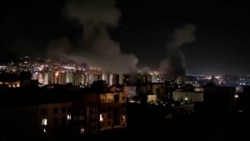
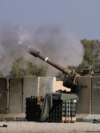

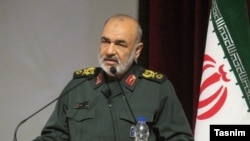
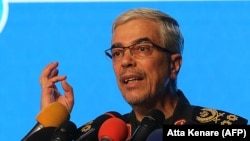
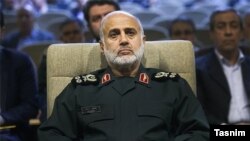
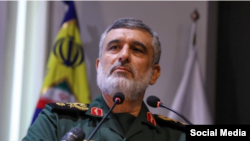
Forum